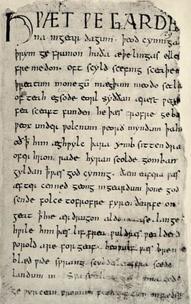Who Wrote Beowulf?
 Many people complain that Shakespeare and the King James Bible are hard to read because they are in Old English. They are wrong. Old English, the language spoken in Anglo-Saxon England before the Norman Conquest, is much more difficult to read.
Many people complain that Shakespeare and the King James Bible are hard to read because they are in Old English. They are wrong. Old English, the language spoken in Anglo-Saxon England before the Norman Conquest, is much more difficult to read.Just looking at the first page of Beowulf, the longest epic poem in Old English, should convince most readers that reading Shakespeare is a piece of cake in comparison.
Were it not for a single medieval manuscript housed in London's British Library, we would not even know the story of Beowulf. The manuscript is undated, but based on an analysis of the handwriting is guessed to have been made somewhere between the end of the 10th century and the death of England's Danish King Canute in 1035.
But the story told in Beowulf is much older than this thousand year old manuscript. Scholars believe the poem must have been passed down orally over many generations. There could have been as many version of the story as there were Anglo-Saxon poets (scops, prounounced 'shop') to tell it, each storyteller modifying it to suit the court in which he sang. In a period of time when few people could read, scops maintained history and upheld or enhanced the ancestry of their patrons.
In my novel Swan Song, I take the position that the original story is much, much older. You can read more about my theory of how old Beowulf is here.
Many of Beowulf's characters, including the Geat king Hygelac, and Hrothgar, the Lord of Heorot Hall, are mentioned in other manuscripts and accounts from the period, which means they are most likely historical personages from 6th century Denmark and Sweden. Some scholars assert that the poem must have been written soon after its historical figures lived, else the scop would have forgotten them. I wonder if the story predates these people, who were added in later by a scop eager to use the age-old story to flatter his patrons.
The story is about the hero Beowulf, who hears that a monster named Grendel is terrorizing a community in Denmark and sails his warriors there to stop Grendel's rampage. Beowulf kills the monster by ripping off its arm, but then must deal with Grendel’s revengeful mother, whom he follows to an underwater lair and finally defeats. The story is clearly pagan in origin. However the scribe who wrote the one remaining copy was likely a monk and clearly a Christian, and his remarks lay a veneer of the new religion atop the old myth.
Beowulf continues to be changed and reshaped by every performance, translation and adaptation. The poem has inspired films, plays, operas, graphic novels, TV miniseries, and computer games. The film The 13th Warrior (1999), was adapted from the novel Eaters of the Dead by Michael Crichton, who, like me, made the monster Grendle into a Neanderthal, but set his story in a much later period than I did.
Swan Song will be coming out on August 20, 2016, but you can preorder it for Kindle here, and as a paperback here.
Published on July 07, 2016 07:30
No comments have been added yet.



